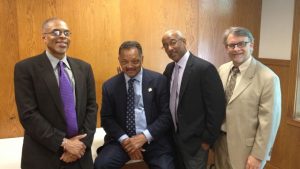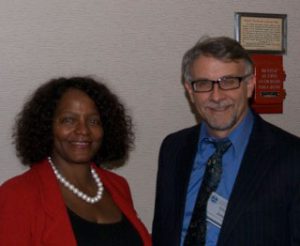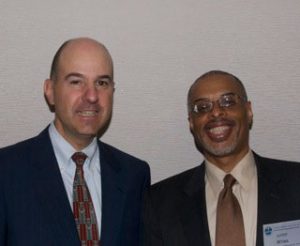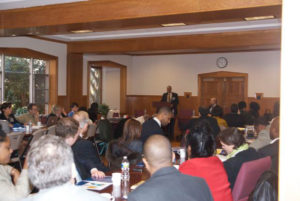IIPSJ IP and Civil Rights Conference | 2012
IIPSJ's IP and Civil Rights Conference was held on Thursday, May 17, 2012 at the Howard University School of Law. Rev. Jesse Jackson Sr. was the keynote speaker. The conference brochure in pdf form is available for download. The conference was cosponsored by IIPSJ and the Black Leadership Forum (BLF).

From left to right: IIPSJ Director Lateef Mtima; Rev. Jesse Jackson; Prof. Roger Groves (Fla. Coastal School of Law); IIPSJ Assoc. Dir. Steven Jamar at IIPSJ IP and Civil Rights Conference - May 17, 2012.
Further Commentary on the Washington NFL Football Team Trademark
As we settle into 2015, we thought you might be interested in a commentary regarding the continuing debate surrounding the name of the Washington NFL football team, Missing the Point: The Real Impact of Native Mascots and Team Names on American Indian and Alaska Native Youth, written by Eirk Stegman, Associate Director of the Half in Ten Education Fund at the Center for American Progress, and Victoria Phillips, who teaches intellectual property and communications law at American University Washington College of Law and is the Director of the Glushko-Samuelson Intellectual Property Law Clinic. Stegman and Phillips discuss the psychological impact of the team’s controversial appellation, noting that “…too much of the debate misses the point. It is not just about a name, a logo, a business, or a matter of intent. Racist and derogatory team names have real and harmful effects on [American Indian and Alaska Native] people every day, particularly young people.” Among other things, the authors note that “AI/AN students across the country attend K-12 and postsecondary schools that still maintain racist and derogatory mascots.
Research shows that these team names and mascots can establish an unwelcome and hostile learning environment for AI/AN students. It also reveals that the presence of AI/AN mascots directly results in lower self-esteem and mental health for AI/AN adolescents and young adults. And just as importantly, studies show that these mascots undermine the educational experience of all students, particularly those with little or no contact with indigenous and AI/AN people. In other words, these stereotypical representations are too often understood as factual representations and thus “contribute to the development of cultural biases and prejudices.”
To read the full commentary, follow the link at https://www.americanprogress.org/issues/race/report/2014/07/22/94214/missing-the-point/
Past internship Placements
Awards earned by students in 2005
Tameka Simmons '05
Ms. Simmons won the 2005 Jan Jancin Award for demonstrating excellence in intellectual property law. Ms. Simmons stands out through her remarkable service, while still a law student, in furthering IP pedagogy at the law school and in CLEs, through her dedication and service to IIPSJ and related HUSL programs, and to the IP Bar. The Jan Jancin Award is a national IP award open to all law schools (a number of whom have large IP and technology transfer programs) and to all of their students. This award is sponsored by the American Intellectual Property Law Association (AIPLA), the American Intellectual Property Law Education Foundation (AIPLEF), and the Intellectual Propert Section of the American Bar Association.
Letoria House '06
At the 2005 annual Giles S. Rich Inn of Court Dinner (at which Sen. Patrick Leahy was the keynote speaker), Letoria House received the Giles S. Rich American Inn of Court Scholarship. This award is bestowed upon a recently admitted lawyer or a law student who has contributed significantly to the Inn as measured by "the degree and quality of participation" and by the person's "contribution to fulfilling the Inn's Mission." Part of the Inn's mission to further the principles of civility, professionalism, and competence in the practice of law. The GSR Scholarship is open to junior Inn members practicing throughout the DC/Maryland/Virginia region and to the student members of the GSR Inn from the five participating law schools (HUSL, Georgetown, Catholic, American, and George Mason).
Stephanie Harris '07
On the eve of her matriculation to HUSL, Ms. Harris became HUSL's first recipient of a Sidney B. Williams, Jr. Intellectual Property Law Scholarship sponsored by the American Intellectual Property Law Education Foundation. This scholarship is open to minority students throughout the nation. It is awarded to minority students with demonstrated accomplishment and potential in the field of IP practice. Ms. Harris's scholarship was renewed in 2005 on the basis of her continuing accomplishments as a HUSL student.
On a related note, Sid Williams, for whom the scholarship is named, is a great friend of HUSL, having served as IIPSJ's inaugural keynote honoree when IIPSJ was launched in 2002.
IP Empowerment Program
General Information
IIPSJ has an ongoing IP Empowerment Program working to empower marginalized communities economically, socially, and politically through their development, use, and lawful exploitation of IP. One of the steps in this ongoing program was the IP Empowerment Summit held on November 5, 2010. (In addition to the information below, the Summit Circular can be downloaded in pdf form.) Ongoing work is being done by committees and interest groups working on particular projects identified at the Summit and through partnering with the USPTO, NAACP, and other organizations.


IIPSJ IP Empowerment Summit
On November 5, 2010, the Institute for Intellectual Property and Social Justice (IIPSJ) conducted its first National IP Empowerment Summit at the Howard University School of Law. The IP Empowerment Summit brought together a diverse group of IP professionals, including IP lawyers from private practice, in-house counsel, and academia, to collaborate with legislators and public interest and community activists to devise strategies for community development built around artistic works and technological innovation.
IIPSJ IP Summit Empowerment Committees will be formed to create both discrete plans on particular topics and to collectively construct a blueprint to help educate and empower socio-economically marginalized communities to protect and commercially exploit their own IP works for their own benefit. We expect these efforts to lead to the establishment of IP Empowerment Zones in strategic urban locations. The groups to be served include associations of artists; students in fine arts, engineering, and science degree programs; community development association; and inventors. IIPSJ IP Summit attorneys will also work to empower attorneys serving these communities to develop the competencies and skills to carry out this work.
IP practitioners from a variety of law firms, in-house counsel departments, academic institutions, and public interest organizations have committed to participate in the IP Empowerment Summit, and plans are underway to link this program to similar initiatives around the nation.
The Need for IP-Focused Empowerment Strategies
In today's information-based economy, economic power is often dependent upon intellectual property. Consequently, IP attorneys can and should take the lead in empowering minority and other marginalized communities to compete for and attain a stake in the 21st century economy. Stimulating an increase in ethnic diversity within the intellectual property bar is a major objective of the Summit, and is a key means to implement the empowerment strategies.
IIPSJ IP Empowerment Summit Core Principles and Objectives
The core principles underlying IIPSJ's community IP empowerment program are:
- Education about IP rights and their value is central to the tasks at hand;
- Helping protect IP rights is a necessary step toward beneficial exploitation of the IP rights;
- Entrepreneurial values and skills are necessary for success of the program; and
- Political activism and legislative lobbying will play a valuable part in any such undertaking.
The one-day IP Empowerment Summit will bring together patent, trademark and copyright attorneys, other IP professionals, and members of the public interest and community action sectors, to meet, discuss, learn, and network about how they can implement the underlying principles through:
- Diversifying the field of IP practice;
- Empowering minority and marginalized communities through the vehicle of IP protection and exploitation; and
- Sharing best practices in an effort to further their professional careers and ascend to strategic positions through which to effectuate social change.
IP Empowerment Summit Pilot Community Programs
The IP Empowerment Summit will function as a clearinghouse of valuable information concerning minority artists, inventors, entrepreneurs, and IP professionals. Information regarding market opportunities and business development trends will also be developed as will a national database of minority IP lawyers. Much of this information will be captured at the Summit and then disseminated through IIPSJ’s website (www.iipjs.org). Summit participants will be invited to join permanent IP Empowerment Action Committees to assess and use the data, and to deploy the IP empowerment agenda through various community programs which include:
Minority Students in Science and Engineering Road Show
This program will engage law students, attorneys, and academicians in the development and presentation of "IP Road Show" programs designed to expose undergraduate minority science, engineering, and fine arts students to the fundamentals of IP law. The twin objectives of this program are to apprise students of information needed to exploit successfully their creative works as well as to expose them to the option of pursuing legal careers in the IP field.
Community IP Rights and Education Program
This program will educate high school and college students as well as community creative artists and inventors about the interconnected themes of the nature of intellectual property rights and of the value of exploiting creator's and inventor's rights. Law students and practicing IP attorneys will undertake to familiarize members of the target communities with the benefits of IP protection, and to help them to more fully appreciate that they are both creative artists and inventors as well as IP end-users. Community artists and inventors will learn how weak creator/inventor rights diminish their own prospects for IP-related economic empowerment. The program will include exploration of public domain material as a preferred source for user-generated content and private innovation since such material has fewer legal restrictions and concomitantly greater prospects for entrepreneurial success.
IP Talent Development Program
This program will bring together IP professionals and entrepreneurs to assist marginalized creative artists and inventors in the propitious exploitation of their creative output in the digital age. Sponsored community workshops and laboratories will provide development facilities, IP-related educational and vocational information, and opportunities for artistic license arrangements and technology transfer agreements.
IP Empowerment and Political Activism Project
This multi-faceted project will seek to increase public awareness and understanding of IP, will engage in political activism through community building around IP issues, and will function as a legislative developments think tank. IP professionals, educators, and public interest and community activists will collaborate on policy initiatives and lobbying efforts intended to impact IP legislation and government initiatives to ensure a close fit between IP rights and empowerment of minorities and other marginalized groups.
IIPSJ Program Date: November 5, 2010
The schedule for the IP Empowerment Program may be downloaded in PDF form.
Sponsors and Supporters
IIPSJ Education and Outreach
From its inception in 2002, IIPSJ has conducted programs to reach out to the bench and bar and to government officials through workshops and seminars as well as through participation in professional organizations such as the Giles Rich Inn of Court and the American Intellectual Property Association. One of IIPSJ's earliest conferences was a continuing legal education program designed for lawyers and judges. The CLE has been done annually ever since.
Over the years IIPSJ has sponsored or participated in various outreach initiatives and programs to educate undergraduates and community members about IP and its opportunities. This aspect continues to grow through partnering with the NAACP, the USPTO, Sramani, and with other organizations for particular programs.
IIPSJ at Howard University School of Law (HUSL) is designed to provide interested students with the tools needed to succeed as IP attorneys and advocates. IIPSJ at HUSL supports the IP curriculum, mentors students academically and professionally, supports student IP and entertainment law organizations, and sponsors outside speakers for various informational student programs.
Judicial Clerkship
The 2011 program will be held on Saturday, Oct. 20, 2011, at Georgetown University Law Center.
The JCIC is an annual program sponsored in part by the Institute for Intellectual Property & Social Justice that brings judges and judicial clerks from around the Washington, D.C., Virginia, and Maryland area to a Washington area law school to meet with law students to provide information about judicial internships and clerkships.
Flyer pdf
When: Oct. 20, 2011
Where: Georgetown University Law Center
What:
- Learn about judicial clerkships and internships from judges and law clerks
- Meet judges from federal and state trial, administrative, and appellate courts
- Hear Judges and law clerks describe the work of their courts and their own experiences
- Understand the application process and the selection criteria for clerkships and internships
Complimentary breakfast and lunch provided.
Registration
register at https://bitly.com/jcic2011rsvp
Sponsoring Organizations
- American University Washington College of Law
- Asian Pacific American Bar Association of the Greater Washington, D.C. Area
- Asian Pacific American Bar Association of Maryland
- Asian Pacific American Bar Association of Virginia, Inc.
- APABA Educational Fund
- George Washington University Law School
- Georgetown University Law Center
- Hispanic Bar Association of the District of Columbia
- Howard University School of Law
- Institute for Intellectual Property and Social Justice, Inc.
- South Asian Bar Association of the District of Columbia
- Vietnamese American Bar Association of the Greater Washington, D.C. Area, Inc.
Internships
IIPSJ at HUSL Internship & Clerkship Programs
IIPSJ, Inc.'s Program at HUSL includes helping place students in internships and clerkships, especially in IP-related settings.
Information is available at
Student Honors
IIPSJ Student Honors
Awards earned by students in 2005
Tameka Simmons '05
Ms. Simmons won the 2005 Jan Jancin Award for demonstrating excellence in intellectual property law. Ms. Simmons stands out through her remarkable service, while still a law student, in furthering IP pedagogy at the law school and in CLEs, through her dedication and service to IIPSJ and related HUSL programs, and to the IP Bar. The Jan Jancin Award is a national IP award open to all law schools (a number of whom have large IP and technology transfer programs) and to all of their students. This award is sponsored by the American Intellectual Property Law Association (AIPLA), the American Intellectual Property Law Education Foundation (AIPLEF), and the Intellectual Property Section of the American Bar Association.
Letoria House '06
At the 2005 annual Giles S. Rich Inn of Court Dinner (at which Sen. Patrick Leahy was the keynote speaker), Letoria House received the Giles S. Rich American Inn of Court Scholarship. This award is bestowed upon a recently admitted lawyer or a law student who has contributed significantly to the Inn as measured by "the degree and quality of participation" and by the person's "contribution to fulfilling the Inn's Mission." Part of the Inn's mission to further the principles of civility, professionalism, and competence in the practice of law. The GSR Scholarship is open to junior Inn members practicing throughout the DC/Maryland/Virginia region and to the student members of the GSR Inn from the five participating law schools (HUSL, Georgetown, Catholic, American, and George Mason).
Stephanie Harris '07
On the eve of her matriculation to HUSL, Ms. Harris became HUSL's first recipient of a Sidney B. Williams, Jr. Intellectual Property Law Scholarship sponsored by the American Intellectual Property Law Education Foundation. This scholarship is open to minority students throughout the nation. It is awarded to minority students with demonstrated accomplishment and potential in the field of IP practice. Ms. Harris's scholarship was renewed in 2005 on the basis of her continuing accomplishments as a HUSL student.
On a related note, Sid Williams, for whom the scholarship is named, is a great friend of HUSL, having served as IIPSJ's inaugural keynote honoree when IIPSJ was launched in 2002.
GSR Inn of Court
The Giles S. Rich Inn of Court for the Court of Appeals for the Federal Circuit
The Giles S. Rich Inn of Court is a professional organization dedicated to advancing the principals of civility and service in the legal profession. One of the Inn's major priorities is providing mentorship and support to newly admitted attorneys and law students interested in IP practice. Each year the Inn invites the participating law schools to select up to four students to participate as Pupil members in all of the Inn's programs and activities.
SInce IIPSJ's founding in 2002, it has developed a strong working relationship with the Giles S. Rich Inn of Court t for the Federal Circuit. IIPSJ Director Lateef Mtima is the current (2009-10) President of the Inn. He has been a member of it since 2003 and has held several other leadership positions in it. (President, ‘09-‘10; Vice-President, ‘08-‘09; Program Chair, ‘05-‘06; Mentoring and Scholarship Chair, ‘04-‘05).
Each year IIPSJ at HUSL's relationship with the GSR Inn provides four HUSL IP students with an especially valuable opportunity of being student members of the Inn of Court even before they become members of the bar. This provides an unparalleled opportunity for students to meet with and learn from practicing lawyers.
IIPSJ IP Law and Policy Think Tank
From its inception in 2002, IIPSJ has developed and disseminated forward-looking ideas about social justice perspectives on and implications of intellectual property law. One of its earliest actions was sponsoring a symposium on IP and social justice which resulted in a number of published articles. It has also started an online library of relevant works. IIPSJ’s principals have presented papers, published articles, infuse their IP courses with social justice perspectives, and advocated social justice positions on various public issues.

In 2010 IIPSJ formalized this aspect of its social justice work with the creation of the IP Law and Policy Think Tank. The IIPSJ Think Tank works with ideas, of course, and it also actively engages target audiences both in the development and implementation of impact programs. While the Think Tank is always examining issues from the perspective of the effect of choices on social justice concerns, the IIPSJ Think Tank is structured flexibly to adapt to the evolving IP environment and various issues it presents.
The Think Tank's core activities are:
- Organizing and hosting scholarly symposia and policy roundtables,
- Hosting and sponsoring visiting scholars and fellows to introduce and develop topical initiatives and permanent programs;
- Conducting and sponsoring targeted research on social justice implications of IP law, policy, and administration;
- Writing, presenting, and distributing position statements and comments on IP-related initiatives by the United States and in the international realm;
- Developing and maintaining Information repositories and other resources for scholars, policymakers, IP creators, IP users, and IP entrepreneurs;
- Collaborating with other NGOs, pedagogical institutions, and IP-interest entities on each of these to further IIPSJ’s social justice objectives; and
- Developing and implementing programs ranging from professional conferences to workshops to hands-on mentoring and provision of services on identified issues.
The IIPSJ Law and Policy Think Tank is the only think tank dedicated to evaluating IP law and policy and related issues from the social justice perspectives of inclusion and empowerment. The Think Tank functions as an incubator for social justice-oriented IP legislative development and amendment; IP Civil Rights activism and community awareness, education, entrepreneurship, and empowerment; and scholarly and professional involvement on important national and international IP law and policy controversies.
The IIPSJ Think Tank uses a multi-disciplinary approach, designed to steward IP law and policy toward a more socially cognizant and equitable IP regime. The IIPSJ Think Tank generates and facilitates collaboration and discourse among legal, scientific, and economic scholars, as well as legislators, policymakers, jurists, practicing attorneys, and civil rights and social activists; conducts research, legislative briefings, public comments, and publications; and promotes and organizes community, activist, and professional coalition building.
The 2011-12 Think Tank program is designed to build upon the important relationships developed in the past year and to capitalize on IIPSJ’s unique achievements and national reputation. Through its past efforts and current plans, the IIPSJ Think Tank is well poised to become a prominent voice for IP-related social justice and civil rights interests.
Among its activities in the 2010-11 program year, the IIPSJ Think Tank:
- Organized the first National IP Social Justice Summit of IP government officials, policymakers, scholars, professionals, and community leaders;
- Conducted a Congressional Policy Briefing on IP and Civil Rights;
- Organized and hosted an IP and Social Justice Scholars Roundtable;
- Prepared and disseminated position papers and submitted comments to Congress and various governmental agencies regarding IP law and policy issues.
In 2011-12, the IIPSJ Think Tank will continue to do such work with particular emphasis on:
- A Legislative IP Social Justice Awareness Initiative, through which it will prepare and submit position statements, public comments, legislative proposals, and otherwise provide information to Congress and other legislative and governmental authorities regarding IP law amendment, enforcement, and social justice interests;
- An IP and Civil Rights Activism Project, through which it will further organize an IP Civil Rights Coalition for IP education, activism, and Digital Entrepreneurship; and
- An IP Scholar Activist Project, through which it will conduct and sponsor scholarly research, conferences, and publications intended to heighten legislative, judicial, practitioner, and social activist awareness of domestic and international IP social justice issues and options for change.
